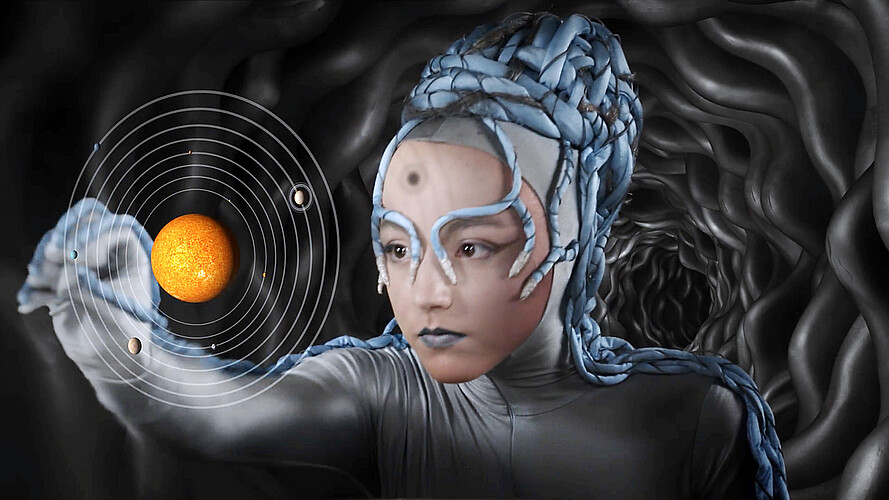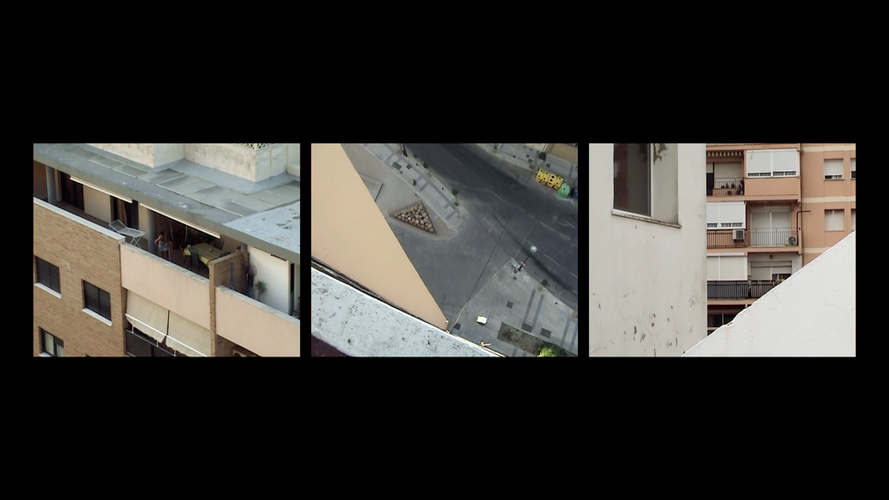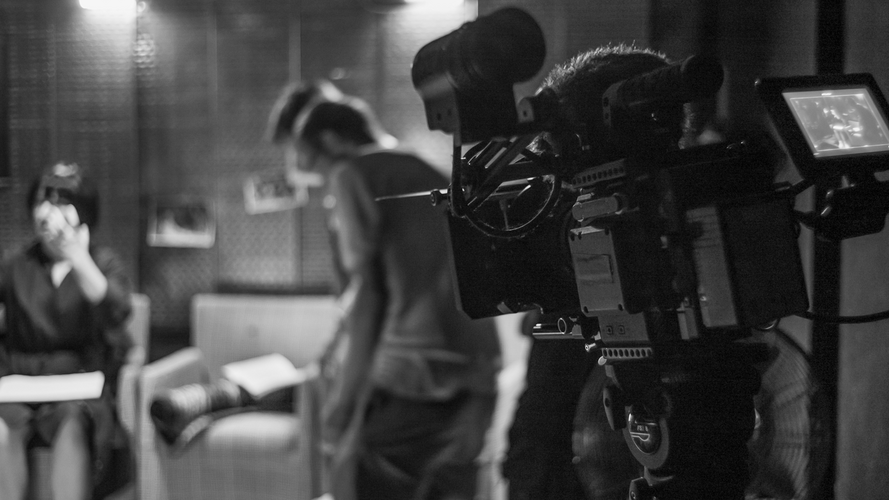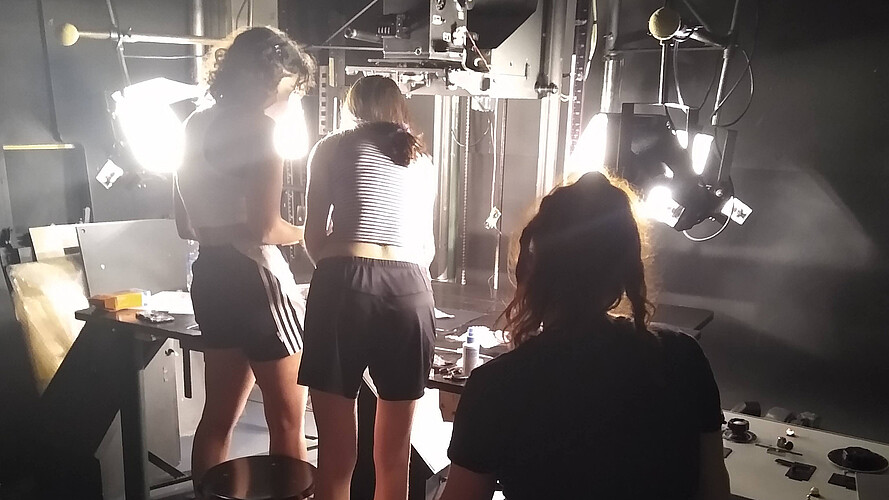SoSe 2022
The woman who flew into space from her apartment
Prof. Nina Fischer and Vanina Saracino
Science fiction (SF) has always been preoccupied with the invention of new worlds—of DIY cosmologies imagining future scientific and technological advances leading to major social and environmental changes. However, as author Ursula K. Le Guin has often stressed, SF is not a prediction of the future, but rather a thought experiment on the present with strong descriptive and analytic qualities; it thus mirrors the concerns and hopes of some, but it also exacerbates the intersectional discrimination and traumas of many across different eras. The fact that the mainstream production of SF has historically been Western, white, heterosexual, and maledriven, is further evidence of how the dominant narratives have actively excluded other speculative fabulations about the future—the feminist, queer, indigenous perspectives, among others.
The woman who flew into space from her apartment will unfold as a nonexhaustive survey offemale perspectives on science fiction in literature,cinema, and visual arts, attempting to highlight the unique narratives of empowerment—feminist, decolonial, and environmental—that have been too often overlooked, and that thrive outside the genre stereotype of intergalactic wars and narratives of scarcity or escapism. Our convenings will take place around speculative fabulations that breed far from the dominant narratives, particularly stressing women’s contribution to the genre across different eras and artistic forms of expression, unveiling SF’s potential to illustrate and understand the present, to create a vocabulary of resistance and a visual culture against discrimination and colonial power, activating the narratives toward a more just future for all critters on Terra and beyond. The title of the seminar is a word pun on Ilya Kabakov’s iconic installation The man who flew into space from his apartment (1984).
Wednesday, 10 AM–1 PM, bi-weekly
First day: 27.04.2022
Further days: 4.05, 18.05, 8.06, 22.06, 29.06, 13.07
Location: Floating (Lilienthalstraße 32, 10965, Berlin)
The seminar is obligatory for students of the class experimental film and media art, other students of UDK and guests on request.
Max. 20 partcipants
Language: english
Please register in advance under: ni.fischer(at)udk-berlin.de
We will gather bi-weekly at the Floating (Berlin), a unique site of urban practice on and in the rainwater retention pool of former Berlin Tempelhof airport, active since 2018. In this self-organized space and group, practitioners from a wide range of backgrounds meet to collaborate, engage, embrace the complexities and navigate the entanglements of the world, imagining and creating different forms of living, while bringing non-disciplinary, radical, and collaborative programs to the audiences.
Planned activities within the seminar include visits to related exhibitions, roundtables with invited artists, collective readings of selected texts, and a series of evening film screenings unfolding in close connection with the seminar Cyborg Futures: cross-disciplinary positions on human/ machine-fusions in contemporary art organized by Constantin Hartenstein and the UdK Film Institute. The woman who flew into space from her apartment will also serve as a departure point for the development of an exhibition taking place in indoor and outdoor public spaces across Berlin, in the summer of 2022. The students will have the possibility to choose either the realization of a practical or a theoretical work related to the topics approached throughout the semester.
Multi-Screens
Lilli Kuschel
In this practical workshop the participants will develop a multi channel videoinstallation ( 2-3 channels). We will focus on the technical workflows and possibilities -
participants will learn how to edit a multi channel project in premiere pro, how to synchronize channels with network connected brights sign media players and we will examine
and play with possibilities and effects working with the produced images on different screens, with monitors and projectors in the space.
The workshop includes an excursion to an exhibition (date and time to be announced).
Participants have to bring pre produced video material that they want to work with during the workshop.
The workshop is mainly for students from Fachklasse Experimenteller Film und Medienkunst - students from other classes can apply to be on the waiting list.
For participation please write a email to l.kuschel@udk-berlin.de until 15.05.22
Fr, Sa 16.6. + 17.6. / Fr, Sa 23.6. + 24.6. / + Excursion
Art, Research, and Ecology - what is it like to be a non-human being?
Eiko Soga
In June, an artist and researcher Eiko Soga will be our guest for a 2-day bloc seminar “Art, Research, and Ecology” at KUM. The seminar will introduce an idea of animistic gestures as ecological practices. Soga will first introduce her findings through ethnographic art projects engaging with an indigenous community in Hokkaido, Japan called the Ainu. The students will be invited to sow seeds together and explore different ways of understanding what it is like to be a seed and a plant to develop different perspectives. This exercise aims to experiment with thinking through performative action that leads to new way of making art. In doing so, we will explore the idea of art as an ecologicalinvestigation and discuss questions:
A How does a piece of art help/allow us to relate to ways of living, gestures, and rituals that are different from ours?
B Often, theory can help us to explain artworks. It provides us with language to explain our work and ideas. But could the making of art become a form of theory?
As a result of the seminar, students will create their own theoretical or practical work based on their research and experience.
Date: June 6-7th, 2022
10.30 am - 16.30 pm plus individual tutorials
Place: GRU 129 and garden
The seminar is open to all students of KUM, and other art departments of the UDK
Language: English
Max. 15 participants
Please register in advance:
eiko.soga(at)sjc.ox.ac.uk
Eiko Soga lives and works in UK and Japan. She is currently reading for PhD in Fine Art at The Ruskin School of Art. Through ethnography-led art practices, she explores the interrelationships within historical, cultural, emotional, and natural landscapes and how art can embody felt knowledge of more than the human world. In doing so, Soga participates in conversations about decolonization, and non-humancentric values.
Eiko Soga presented her movies in 2020 at the class Experimental Film and Media Art. See podcast:
current-situation.medienhaus.udk-berlin.de/oxford-udk-berlinpartnership-in-arts-and-humanities/
www.eikosoga.com
Camera for advanced students PRACTICAL EXERCISES ON DIGITAL CAMERAS
Till Beckmann
Beyond the deepening of technical foundations, we will focus on the composition of the image in time and space. Also, we will discuss advantages and challenges of full-format / highresolution digital film cameras. All these questions will be explored with practical tests.
Till Beckmann (drtill@drtill.de)
Block seminar
May 06 & 07, 10 am - 6 pm
Camera for advanced students PRACTICAL EXERCISES ON DIGITAL CAMERAS
Till Beckmann
Beyond the deepening of technical foundations, we will focus on the composition of the image in time and space. Also, we will discuss advantages and challenges of full-format / highresolution digital film cameras. All these questions will be explored with practical tests.
Till Beckmann (drtill@drtill.de)
Block seminar
May 06 & 07, 10 am - 6 pm
Analogue Comeback
Antonio Castles
Technologische Paradigmen bestimmen Arbeitsabläufe und deren Ergebnisse. In denersten Jahren des digitalen Wandels schien es, als sei die Existenz des Films in Frage gestellt, da die digitale Technik eine Vielzahl von Vorteilen bot. Die chemische und die elektrische Technologie standen im Bereich der Bilderfassung in einem Konflikt, und der Newcomer war im Vorteil. Jahre nach der Konsolidierung der digitalen Technologien als Standard in der Branche erleben wir ein analoges Wiederaufleben. Statt einer Kreuzung, an der sich analoge und digitale Wege trennen, befinden wir uns derzeit in einem Moment der hybriden Konvergenz. Analoge und digitale Arbeitsabläufe können auf eine Weise kombiniert werden, bei der sich ihre Vorzüge gegenseitig ergänzen. Das Ziel dieses Kurses ist es, einen praktischen Überblick über die verschiedenen Arbeitsschritte dieses hybriden Prozesses zu geben: Das Drehen von 16-mm-Film, die manuelle Entwicklung, das film-out (das Belichten von digitalem Material auf Film), der analoge Schnitt und die Digitalisierung werden die Prozesse sein, die in diesem Kurs behandelt werden, um schließlich ein digitales Video zu erstellen.
Der Kurs wird in zwei fünfstündigen Blöcken und einer viertündigen Sitzung stattfinden.
Theoretisch-/Praktisches Seminar für Studierende von KUM, andere UDK Studierende falls Plätze frei sind.
Termine:
14.05.2022 11.00-15.00 Uhr
27-28.5.2022 11.00-16.00 Uhr
Ort: Gru 128 / 304
Bitte um Voranmeldung unter: antonio.castles(at)gmail.com
English:
Technological paradigms determine workflows and their outcomes. During the early years of the digital transition, it seemed that the very existence of film was put into question, since digital offered an extensive list of advantages. The chemical and the electrical were in conflict in the field of image capture, and the newcomer had the advantage. Years after the consolidation of digital technologies as the standard in the industry, we are experiencing an analogue resurgence. Instead of a crossroad where analogue and digital represent divergent paths, we currently stand in a moment of hybrid convergences. Analogue and digital workflows can be combined in ways in which their virtues complement eachother. The goal of this course is to present a practical overview of different stages of this hybrid process: Shooting 16mm film, hand development, “film-out” (exposing digital footage onto film), analogue editing and digitization will be the processes covered in this course to create a digital video. The course will take place in three fourhour long blocks and a shorter two-hour session for presenting the final results.
Theoretical and practical seminar.





